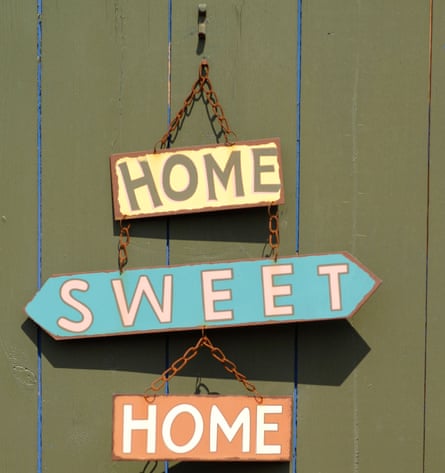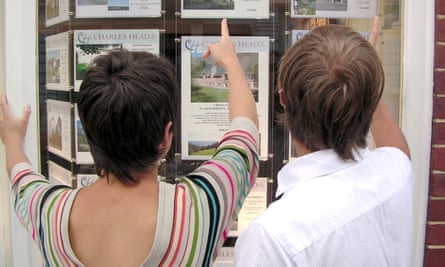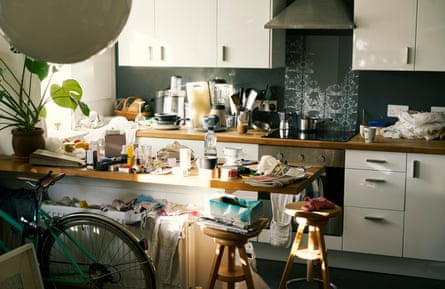Make sure you can move
It sounds obvious but it is worth asking yourself why you want to sell your house and whether you will achieve what you want from the sale. Simon Shinerock, the chair of Choices Estate Agency, says it is worth checking out the area you want to move to and speaking to a mortgage broker to make sure you can get the finance for your next purchase. “Think about your linked purchase – will it dovetail [with your move]? Are you willing to move into rented accommodation if it doesn’t?” Shinerock says. These are all things that could determine how you feel about an offer from a buyer later.
Create a good first impression
As soon as you have decided to sell, you should work on making sure your home looks as presentable as possible – even before you invite an estate agent in. “We’re all people, and if I’m going round and looking at a place and working out how easy it will be to sell and how much it will go for, then my perception of your property will affect that,” Shinerock says. “I wouldn’t invite anyone round to my house without first attending to it.”

He says “people will buy what they see” – would-be buyers want to be shown a property they can mentally move into straight away.
A tidy appearance to the front of your home doesn’t just include tidying up the garden or weeding the pathway, says Sanel Konyar, an interior designer who runs Interior Kollection. “It also applies to your front door and any accessories you add surrounding this first point of contact with potential buyers.” Repainting a tired-looking front door is a good start, as is mending a broken gate – anything that looks in need of fixing could be noted by a potential buyer as a hassle or expense they could do without.
“If your outdoor mat looks like it has seen better days, remove and replace. This is an easy and cheap way to improve a buyer’s first glance yet is so often overlooked,” Konyar says. “If your front door features glass panels or a porch with glass before your front door, ensure that the hallway is clutter-free and boots and shoes are tidied away.”
Get valuations
Talk to local estate agents and see if they will give you a quote for what the property is worth and their commission. A good place to start when picking an agent is recommendations from friends who have moved recently. See which companies have lots of boards (saying sold as well as for sale). You can use property websites such as Zoopla and Rightmove to get an insight into which agents are successfully selling homes near you – tick sold in your search to see these. Make contact and arrange to get an appraisal of your home.

Choose an agent
Once you have spoken to several estate agents you need to choose which one to go with. Compare their commission, sales success, valuation and where they advertise. You might choose the one you liked best – having a good rapport is important – or your decision might be based on the price or their recent success rate. If you like one agent but have been offered a better commission or shorter contract by another firm, don’t be afraid to ask your favoured person if they can match it. Agents are often willing to negotiate – especially when there are more buyers around than there are homes on the market.
Clear outstanding issues
When you get an offer, your buyer’s solicitor will ask for all kinds of paperwork – you can prevent any hold-ups later by making sure you can put your hands on it now.
Alex Lyle of the estate agency Antony Roberts says there’s a long list of things you should try to get ready, including proof of ID, as well as documents linked to any work you have had done on your property. Building regulations approval, planning permissions, Fensa certificates for replacement windows and doors, and a safety certificate for any new boiler are among the paperwork you will need to show – so pull them together now.
Doing so gives you the chance to check there are no outstanding issues that need sorting out.

Get your team in place
Lyle says: “Too often, properties go under offer and then there’s an unnecessary delay in anything further happening. Usually, this is due to the vendor having not instructed a solicitor, or the solicitor has been instructed but doesn’t have the necessary information to provide to the buyer’s solicitor.”
Clare Andrews, a residential property partner at the law firm Moore Barlow, says there are practical advantages to acting early. “In a competitive market, appointing a solicitor as soon as you can, not only sends a clear message out to potential buyers that you’re ready to proceed without delay, but gives your solicitor time to review the title deeds and iron out anything that could cause a problem in the transaction.”
There is no harm in researching and choosing a solicitor to do your conveyancing before your property is on the market. Again, recommendations from friends are the best start. Otherwise, you can use the Law Society website to find a property specialist and check out reviews for the ones nearby.
Decide on a price
You will probably have an idea of what you want to raise from the sale – maybe based on what you have seen other properties go for in your neighbourhood. Shinerock says this may be useful “if you live on a road where there are lots of generic properties changing hands regularly” but if your home is at all different from those of your neighbours, you could be misled.
Think about what the agents have suggested but bear in mind that some work on high turnover, so will underprice to sell fast – but that won’t get you top dollar.
Starting too high is a danger as being forced to reduce the price on your property can give potential buyers the impression that something is wrong with your home.
Lyle says you should not get carried away when deciding what to ask for: “It’s better to come on to the market slightly lower, attract more interest, and let people bid each other up to your desired price feeling like they’ve really won it.”
Keep things neat …
Keep inside as clutter-free as you can for the agent’s photos and viewings. Samantha Agbontaen, the founder of Housedesigner.net, says sellers should avoid having too much furniture “and drastically reducing free space available for walking”. Your house will feel bigger if people can move around without having to squeeze past your belongings, so it could be worth putting some things in storage. If you have a loft or watertight shed you can stash things there. If not, it may be worth paying for storage for a few weeks to maximise the price you get for your home.

… but not too neat
“If your home is too minimalist, this can make it feel clinical and uninviting to potential buyers,” Konyar says. She suggests using throws, cushions and rugs to make sure it feels like a home.
Think about who might buy your house and whether your decor will appeal to them. If you are planning to repaint any rooms, go for neutral colours and use accessories to add a bit of character.
